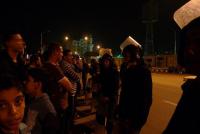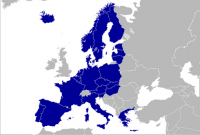-
NATO fleet deployed in Aegean Sea to stop refugees coming from Turkey

NATO has deployed its fleet to the Aegean Sea in an effort to end the flow of refugees crossing from Turkey in order to enter the EU zone. The deployment, announced yesterday, will involve warships, rather than coast guard boars, meet refugee boats outside Greece’s territorial waters.
-
-
Fixing failed SBInet: Contract delays, quality issues at CBP
Since DHS secretary Janet Napolitano in 2011 cancelled the failed SBInet program, CBP’s Office of Technology Innovation and Acquisition (OTIA) has awarded defense contractors approximately $186,000,000 to replace it. Mark Borkowski’s Office of Technology Innovation and Acquisition (OTIA) has created problems which directly impacting safety and productivity of Border Patrol agents: The needlessly delayed Integrated Fixed Towers (IFT) project has once again placed Border Patrol agents in harm’s way because the men and women who risk their lives patrolling the line still do not possess sophisticated surveillance technology to fight the drug cartels, human traffickers, and potential terrorists crossing our international borders.
-
-
Calls for banning Muslims from entering U.S. impractical, harmful: Expert

Duke sociologist Christopher Bail, who studies how anti-Muslim organizations use social media, says that calls to ban immigration of Muslims to the United States are missing two important points. First, there is no conceivable mechanism whereby the United States could identify Muslims — short of visual cues such as headdress or religious garb, which are not worn by most Muslims. Second, and perhaps more importantly, it is surprising that people think that groups such as ISIS could not disguise terrorists they want to send to the United States as non-Muslims.
-
-
Five European countries face removal from Visa Waiver program
DHS has told five countries – France, Belgium, Germany, Italy, and Greece – that they have until Monday, 1 February, to fix a security flaw – DHS described it as a “crucial loopholes”— in their passport stems. If they fail to do so, they will be removed from the Visa Waiver program. The move will affect millions of European citizens.
-
-
Sweden will expel 80,000 refugees whose asylum applications were denied

Sweden’s interior minister Anders Ygeman said on Wednesday that Sweden plans to expel up to 80,000 asylum seekers who entered the country in 2015 and whose applications had been rejected. Ygeman noted that normally expulsions are carried out using commercial flights, but in light of the large numbers involved, specially chartered aircraft would be used – and the process would take a few years.
-
-
U.S. undocumented population declines
In a just-released report, the Center for Migration Studies of New York (CMS) finds that the U.S. undocumented population has fallen below eleven million for the first time since 2004. The report also offers evidence that the Mexican-born undocumented population continues to decline, falling by more than 600,000 since 2010. The study further describes trends in the undocumented population over the past few years for selected countries of origin and states of residence.
-
-
Greece to be expelled from Schengen free travel zone agreement

Greece is likely to be expelled or suspended from the Schengen free movement zone as European leaders appear to have concluded that the Greek government does not have to will, or the ability, to control the country’s borders. EU have been pressuring Greece for months to stem the flow of refugees from Turkey into Greece – and from Greece to other EU countries – but to no avail.
-
-
Migration crisis might destroy Europe: French PM Manuel Valls

Europe cannot take in all the refugees fleeing war-torn Syria and Iraq and the migration crisis is putting the European Union in grave danger, the French Prime Minister Manuel Valls has said. Valls, speaking at the World Economic Forum in Davos, said that “The concept of Europe that our founding fathers had…is in very grave danger,” and that Europe needed to take urgent action to control its external borders. “Otherwise,” he said, “our societies will be totally destabilized.”
-
-
Europe’s failed response to refugee crisis risks fraying local labor markets

As this crisis continues to unfold and countries in Europe reevaluate how to manage its challenges, it is essential that we take time to appreciate the broader context of the problem and some of the issues that have been neglected, specifically the negative effects on labor markets. While the plight of the refugees is desperate, the consequences of the crisis are also dire for some of the most significant achievements of European integration: open borders, social welfare, and human rights. They have also affected the functioning of European labor markets in ways that have been poorly understood. Understanding these effects is important because welfare, peace, human rights, and open borders all depend on the capacity of governments to generate wealth through work and production.
-
-
1 percent of visitors to U.S. over-stayed past 2015 exit dates

DHS said that about 1 percent of visitors who arrived in the country by air or sea remained in the country last year after they were supposed to leave. DHS release data on Tuesday which show that about 45 million of those visitors were due to leave at some point in the year ending 30 September, and that DHS could confirm that all but 416,500 had exited the country. Another 66,500 people stayed past their leave date, but later left the United States.
-
-
Immigrants play growing role in U.S. science and engineering (S&E) workforce
Immigration is a significant factor in decade-long growth in total science and engineering (S&E) workforce. From 2003 to 2013, the number of scientists and engineers residing in the United States rose from 21.6 million to 29 million. This 10-year increase included significant growth in the number of immigrant scientists and engineers, from 3.4 million to 5.2 million. Immigrants went from making up 16 percent of the science and engineering workforce to 18 percent.
-
-
Canada avoids sex attacks by accepting refugee families over single men
Canada’s immigration minister John McCallum said Canada will not suffer from Cologne-style sex attacks because the country “carefully selects” the Syrian refugees it takes in. McCallum said that because Canada has welcomed Syrian refugees “with open hearts and love,” Canadians will not be affected by their resettlement as Germany has been. “Most of them are not single men. Most of them are family members. Whereas Germany accepts everybody that comes to its borders,” McCallum said.
-
-
Czech president says integrating Muslims into Europe is “impossible”

Czech president Milos Zeman, who gained a name for his ardent anti-immigration stance, asserted on Sunday that it was “practically impossible” to integrate the Muslim community into European society. Zeman last week claimed that the influx of migrants into Europe was orchestrated by Egypt’s Muslim Brotherhood, and that he Islamist group was receiving money from several states to finance a Muslim effort to “gradually control Europe.”
-
-
Germany creates IDs for refugees

Germany’s parliament on Thursday voted for bill which would require refugees to carry a new ID card which would be linked to a centralized refugee database. The refugees will receive IDs that will include biometric information such as fingerprints, all the information required for an asylum request, country of origin, contact details, health status, and educational and professional qualifications. A centralized system will German federal and state agencies access to the information.
-
-
Switzerland to seize assets from refugees to cover upkeep costs
In a move which mirrors a policy approved by the Danish parliament earlier this week, the Swiss government announced that refugees arriving in Switzerland have begun to turn over to government agencies any assets worth more than 1,000 Swiss francs (£690). Refugees who are approved for staying and working in Switzerland have to surrender 10 percent of their pay for up to ten years until they repay 15,000 Swiss francs in costs.
-
- All
- Regional
- Water
- Biometrics
- Borders/Immig
- Business
- Cybersecurity
- Detection
- Disasters
- Government
- Infrastructure
- International
- Public health
- Public Safety
- Communication interoperabillity
- Emergency services
- Emergency medical services
- Fire
- First response
- IEDs
- Law Enforcement
- Law Enforcement Technology
- Military technology
- Nonlethal weapons
- Nuclear weapons
- Personal protection equipment
- Police
- Notification /alert systems
- Situational awareness
- Weapons systems
- Sci-Tech
- Sector Reports
- Surveillance
- Transportation
Advertising & Marketing: advertise@newswirepubs.com
Editorial: editor@newswirepubs.com
General: info@newswirepubs.com
2010-2011 © News Wire Publications, LLC News Wire Publications, LLC
220 Old Country Road | Suite 200 | Mineola | New York | 11501
Permissions and Policies
Editorial: editor@newswirepubs.com
General: info@newswirepubs.com
2010-2011 © News Wire Publications, LLC News Wire Publications, LLC
220 Old Country Road | Suite 200 | Mineola | New York | 11501
Permissions and Policies
